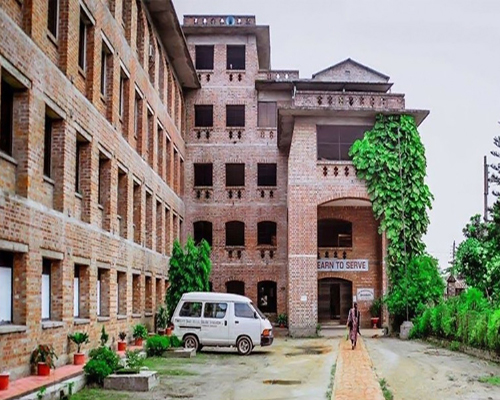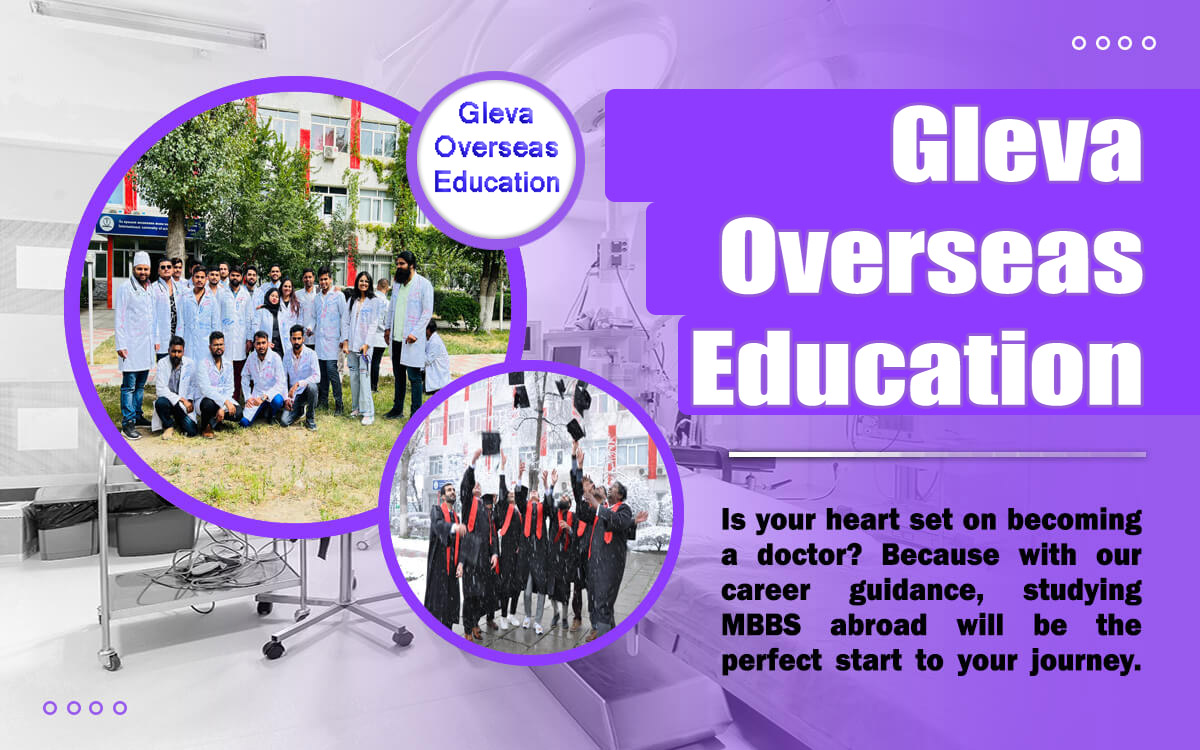
Recognized by NMC (NATIONAL MEDICAL COMMISSION)
Recognized by Bangladesh Medical & Dental Council(BMDC), WDOMS, IMED and FAIMER
WHO approved
Community Based Medical College in Bangladesh provides a remarkable opportunity for Indian students to pursue their medical education abroad. To ensure a smooth admission process and make the journey hassle-free, Gleva Overseas Education Pvt. Ltd. (GOEPL) offers expert guidance and support specifically tailored for Indian students. GOEPL is a renowned consultancy firm that specializes in assisting students with their applications to medical universities abroad.
With their experienced team of counselors, GOEPL provides comprehensive guidance and support to Indian students interested in studying at Community Based Medical College. They assist students in selecting the appropriate program that aligns with their career goals and aspirations. GOEPL also helps students navigate through the admission requirements, ensuring all necessary documents and applications are submitted accurately and on time.
In addition to application assistance, GOEPL offers valuable guidance in securing financial support, including information about scholarships, grants, and other funding opportunities available to Indian students. Their expertise and knowledge of the medical education system abroad, coupled with their personalized approach, ensure that Indian students receive the necessary support and guidance to embark on a successful medical education journey at Community Based Medical College.
With the reputable guidance of Gleva Overseas Education Pvt. Ltd., Indian students can confidently pursue their dreams of studying medicine at Community Based Medical College in Bangladesh. GOEPL's commitment to providing expert guidance and support streamlines the admission process, allowing Indian students to focus on their academic and professional growth while studying medicine abroad.
Community Based Medical College (CBMC) is a unique and specialized type of medical university that focuses on community health and healthcare education. Established in 1995, CBMC follows a distinctive model that aims to address the shortage of medical professionals in underserved areas and improve the overall health outcomes of the community.
CBMC programs are specifically designed to train physicians who are dedicated to serving communities and working towards enhancing the health of vulnerable populations. The curriculum and training provided at CBMC emphasize community involvement and instill a sense of social responsibility in students.
One of the key features of CBMC is its emphasis on community engagement. Through various programs such as community service projects, community health education, and clinical rotations in community health centers, students gain firsthand experience in community healthcare. These initiatives expose students to the unique challenges and healthcare needs of underserved populations, preparing them to become compassionate and effective healthcare providers.
CBMC programs also have a strong focus on primary care, recognizing its vital role in promoting community health. Primary care physicians serve as the first point of contact for patients seeking medical attention and are responsible for managing their overall health and coordinating specialized care if necessary. CBMCs equip students with the necessary skills and knowledge in the management of chronic diseases, preventive care, and health promotion, thereby nurturing a cadre of primary care physicians who are well-prepared to meet the healthcare needs of communities.
By adopting a community-based approach to medical education, CBMCs contribute significantly to bridging the healthcare gaps in underserved areas. These institutions produce healthcare professionals who are not only clinically competent but also understand the social determinants of health and are committed to making a positive impact on the communities they serve.
The academic programs offered at Community Based Medical College (CBMCs) are designed to provide students with a comprehensive understanding of healthcare, encompassing not only medical knowledge but also critical thinking and communication skills. The curriculum is carefully integrated with community health projects to emphasize the importance of community involvement in healthcare. Students engage in coursework covering subjects such as anatomy, physiology, pharmacology, clinical ethics, and patient communication.
One of the key strengths of CBMCs is their unique focus on community health, setting them apart from traditional medical schools. CBMCs prepare physicians who are not only well-educated in their field but also equipped to serve underserved communities. This emphasis on community health is reflected in the clinical rotations that students undertake. They are placed in community health centers, rural clinics, and other underserved areas, where they gain practical experience in healthcare delivery and learn about the healthcare challenges faced by these communities.
Furthermore, CBMCs excel in promoting interprofessional education. In addition to medical students, CBMCs also provide education to nursing students, social workers, and other healthcare professionals. This collaboration among different healthcare disciplines fosters teamwork and enhances communication among healthcare providers, ultimately benefiting the patients they serve.
The academic programs at CBMCs not only impart knowledge and skills but also instill a sense of social responsibility and community engagement in students. By immersing themselves in community-based healthcare settings, students develop a deeper understanding of the healthcare needs and disparities in underserved areas. This hands-on experience prepares them to become compassionate, culturally sensitive, and patient-centered healthcare professionals who are committed to addressing the healthcare challenges faced by their communities.
Community Based Medical Colleges (CBMCs) strive to provide students with facilities that support their education and enhance their practical experience in community healthcare. These colleges understand the importance of well-equipped facilities in preparing students to address the healthcare challenges faced by underserved populations. Here are some key aspects of facilities at CBMCs:
1. Campus Infrastructure: CBMCs have modern and spacious campuses that are designed to create a conducive learning environment. They have well-maintained lecture halls, laboratories, and simulation centers equipped with the latest medical equipment and technology. These facilities enable students to acquire hands-on experience and develop their clinical skills.
2. Community Health Centers: CBMCs often have affiliations with community health centers located in underserved areas. These centers serve as training grounds for students, providing them with the opportunity to engage with real patients and practice under the guidance of experienced healthcare professionals. These practical settings enable students to understand the unique healthcare needs of the community and develop empathy and cultural sensitivity.
3. Research Facilities: CBMCs prioritize research in community health, and therefore, they provide dedicated research facilities. These facilities are equipped with resources and equipment necessary for conducting studies that aim to address the healthcare challenges faced by underserved populations. CBMCs encourage students and faculty members to actively participate in community-based research projects, fostering collaboration with the local community.
4. Libraries and Learning Resources: CBMCs have well-stocked libraries that provide access to a wide range of medical literature and resources. These libraries support students' academic pursuits and research activities. Additionally, CBMCs often provide online databases and electronic resources, allowing students to stay updated with the latest advancements in the field of medicine.
By offering these facilities, CBMCs ensure that students receive comprehensive education, practical experience, and exposure to community healthcare. These facilities play a crucial role in preparing students to become competent healthcare professionals dedicated to serving underserved populations and improving community health outcomes.

Choosing to pursue a medical education at the Community Based Medical College in the Bangladesh presents students with a remarkable opportunity to receive top-notch medical training at a reasonable cost. Studying medicine at this esteemed institution is known for its affordability, making it an appealing option for aspiring medical professionals seeking excellent education without the hefty price tag commonly associated with medical programs in other countries.
The Community Based Medical College offers a comprehensive six-year program that equips students with the essential knowledge, skills, and practical experience required to excel in the medical field. The curriculum is designed to provide a well-rounded education that prepares students to become competent and successful medical practitioners.
One of the notable advantages of studying medicine in the Bangladesh is the affordability factor. Tuition fees at the Community Based Medical College and other medical schools in the country are considerably lower compared to many international counterparts. This makes the Bangladesh a preferred destination for students from various backgrounds, providing them with an accessible pathway to pursue their dreams of becoming medical professionals.
Despite the affordable nature of the education, the medical colleges in the Bangladesh uphold high standards of academic excellence. The Community Based Medical College, renowned for its quality education, ensures that students receive top-quality instruction, practical training, and mentorship from experienced faculty members.
By choosing to study medicine at the Community Based Medical College in the Bangladesh, students can embark on a fulfilling educational journey that not only offers an affordable option but also guarantees a first-rate medical education that prepares them for a successful career in the healthcare field.
The MBBS program at Community Based Medical College in Bangladesh is designed to equip students with a thorough medical education over a span of six years. This comprehensive program aims to cultivate well-rounded doctors by providing them with the necessary knowledge, skills, and practical experience.
During the initial five years of the program, students participate in a variety of educational activities, including classroom lectures, laboratory work, and practical training in different medical disciplines. They delve into subjects such as anatomy, physiology, biochemistry, pharmacology, pathology, and more. This foundational knowledge serves as the building blocks of their medical education, ensuring a strong academic foundation.
The final year of the program involves clinical rotations in hospitals or medical centers. This hands-on experience enables students to apply their theoretical knowledge in real-world clinical settings. They gain valuable practical experience in diagnosing and treating patients, performing medical procedures, and collaborating as part of a healthcare team. The internship period is a pivotal phase that bridges the gap between theoretical learning and actual medical practice.
Upon successful completion of the six-year MBBS program, students are granted their medical degree. This degree holds recognition from international medical councils and associations, opening doors for graduates to pursue medical careers not only in Bangladesh but also in various countries worldwide. The six-year duration of the MBBS program at Community Based Medical College offers students a comprehensive understanding of the medical field, hones their clinical skills, and prepares them for a successful future in medicine.

Student life in Bangladesh offers a vibrant and enriching experience for those pursuing their studies, especially in the field of medicine (MBBS). The country has numerous prestigious medical colleges that attract aspiring students from around the world. Engaging in student life involves not only attending classes and studying but also participating in various extracurricular activities, cultural events, and sports. The campuses provide a supportive environment, where students can form lifelong friendships and engage in academic collaborations.
When it comes to Indian food in Bangladesh, students studying MBBS can savor a delightful culinary journey. Indian cuisine has a significant influence on the culinary landscape of Bangladesh, thanks to the historical and cultural ties between the two nations. From mouthwatering biryanis and flavorful curries to delectable street snacks like samosas and pakoras, Indian cuisine offers a wide range of options. Restaurants and food stalls across college towns and cities in Bangladesh cater to the diverse tastes of students, providing them with authentic Indian dishes that remind them of home. Exploring the local food scene not only satiates their appetite but also helps them immerse themselves in the rich flavors of the subcontinent, making their student life all the more enjoyable.

Stay ahead of the curve on your MBBS admission abroad! Sign up for our expert medical consultancy updates and receive the latest news and advice on top international universities, application procedures, scholarships, and more. Don't miss your chance to make become a Doctor a reality.